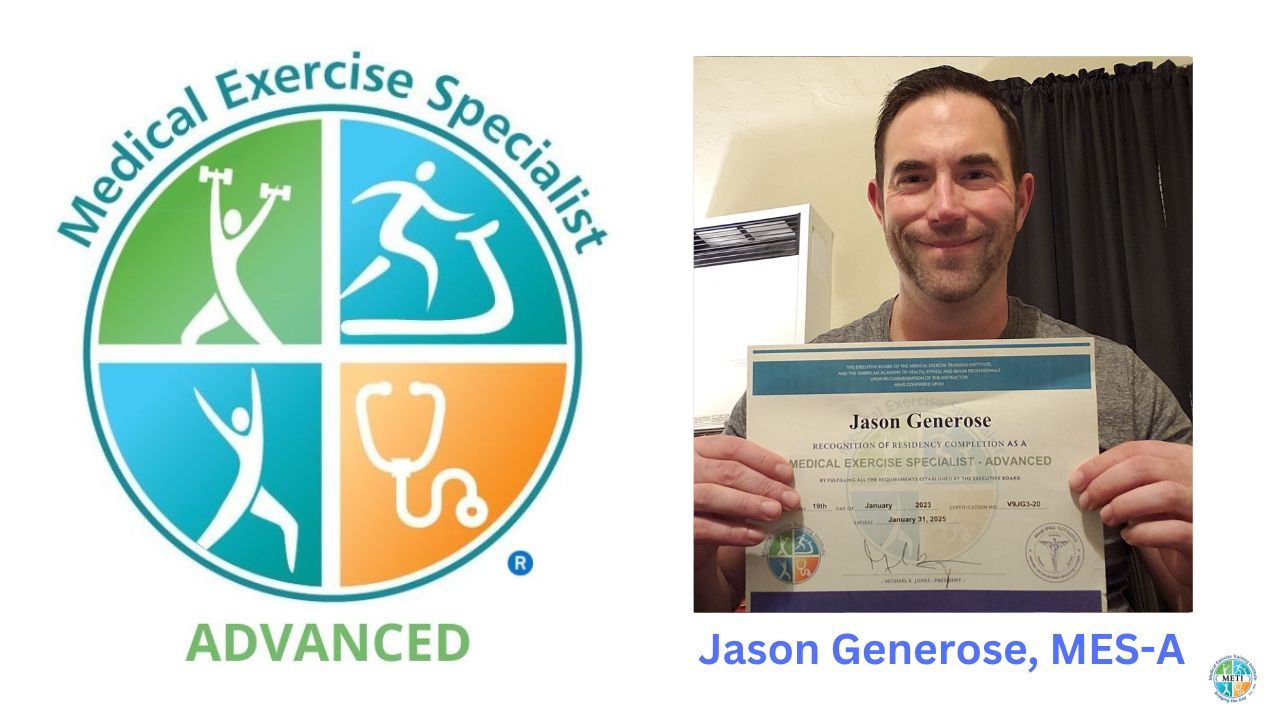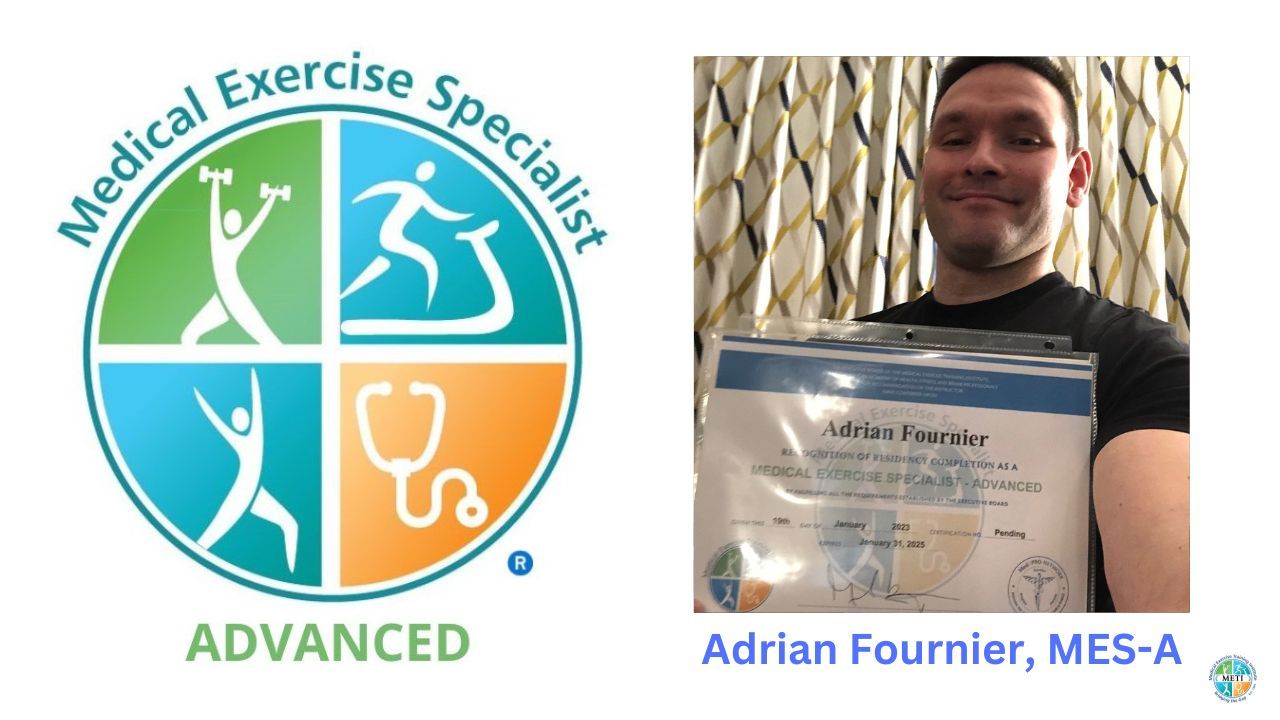Jason Generose, MES-A - Pasadena, CA

CONGRATULATIONS to Adrian FournierJason Generose, MES-A on completion of the Advanced Medical Exercise Specialist (AMES) Residency. The AMES residency is a year-long intensive deep dive into managing medical conditions using exercise. This AMES class started in March 2022 and concluded in January 2023. Jason completed the 26 AMES Client Management Sessions, the 4-day AMES hands-on workshop as well as a presentation of a detailed MET client case study to his AMES peers. Thank you Jason for your persistence and your dedication to "Medical Exercise Training".
Hey Jason.....GO EAGLES!!
Adrian Fournier, MES-A - Toronto, ON

CONGRATULATIONS to Adrian Fournier, MES-A on completion of the Advanced Medical Exercise Specialist (AMES) Residency. The AMES residency is a year-long intensive deep dive into managing medical conditions using exercise. This AMES class started in March 2022 and concluded in January 2023. Adrian completed the 26 AMES Client Management Sessions, the 4-day AMES hands-on workshop as well as a presentation of a detailed MET client case study to his AMES peers. Thank you Adrian for your persistence and your dedication to "Medical Exercise Training".
Congratulations to the 2022 AMES Residency Graduates

CONGRATULATIONS to our Advanced Medical Exercise Specialist (AMES) Residency 2022 graduates. This is our second class of graduates. The AMES residency is a year-long intensive deep dive into managing medical conditions using exercise. This AMES class started in March 2022 and concluded in January 2023. Each resident completed the 26 AMES Client Management Sessions, the 4-day AMES hands-on workshop as well as the presentation of a detailed MET client case study to their peers.
I would like to congratulate and thank each of our AMES residents for their commitment to the residency and their dedication to our new profession – “Medical Exercise Training”. Our MES-
...Managing the Rheumatoid and Lyme Disease Client...MES Masters
Hello Medical Exercise Specialists. We just completed our second MES Masters session. In this session, Wendy Larkin, MES-A of San Francisco, CA presents a client diagnosed with rheumatoid arthritis and Lyme Disease. Dr. Jones serves as the moderator and discusses the key points of anatomy/pathology, the assessment procedures, and exercise modifications for this client. Thanks to Wendy for a great case study presentation!
The MES Masters is designed for medical exercise professionals to share and build their knowledge and skills in managing the most challenging medical exercise clients. The Masters is the next step in growing your MET skills after completion of your MES certification. Join the MES Masters and gain access to our live and recorded case study presentations. Go to www.MESMasters.com to register.
Medical Exercise Specialists.....Do You Dread Paperwork?
Medical Exercise Specialists do you dread the idea of writing down each and every exercise, set, and rep in your client’s training session? Do you hate the idea of writing letters to physicians, therapists or insurance carriers? If you said yes, then you should attend the Medical Exercise Training Documentation and Communication (MET DOC-COM) workshop beginning February 4th.
Medical Exercise Specialists and post rehab professionals will soon have to document every training session and communicate with medical professionals the client’s progress. At best, documentation and communication are challenging, boring, and sometimes a pain, but these are necessary skills every MES must have.
You Can Manage the Paperwork
In the MET DOC-COM workshop, you will learn how to document your MET assessments and sessions with your clients. You will also learn how to communicate with medical professionals and even insurance companies. We will also review the components required in documentation and...
The MES Masters Has Started!!
Hello everyone.....the MES Masters has started!! This is a one-of-a-kind program for medical exercise professionals. In the MES Masters Medical Exercise Specialists from around the world present their most challenging clients and share their assessment, exercise, and progression strategies. This allows you to see and learn what others are doing and helps you better "manage medical conditions using exercise". Join us today for the MES Masters at www.MESMasters.com.
MES Masters Starts Thursday

MES Masters Training Series starts Thursday, January 5th at 9 pm ET. The MES Masters features medical exercise professionals from around the world sharing and presenting their most challenging MET clients. See how others are managing their clients and building their practices. Join now and increase your skills managing medical conditions using exercise. Go to www.MESMasters.com and register.
MES Masters Early Bird Deadline Extended!!
We've extended the MES Masters Training Series deadline to Boxing Day - Monday, December 26th at 11:59 pm!!
Happy Holidays!!!



 Happy Holidays and best wishes to you and yours from the Medical Exercise Training Institute. All the best for 2023!!
Happy Holidays and best wishes to you and yours from the Medical Exercise Training Institute. All the best for 2023!!